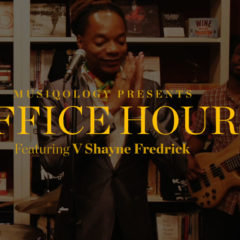“What’s Going On” is MusiQology’s weekly news round-up. Running each week, we curate a selection of relevant items from across the spectrum of popular culture, adding our own commentary and spin when it makes sense. With any luck, you’ll be able to spend a little less time browsing the web for what matters. We’ve got you covered.
Unquestioned, Unchallenged
With the surprise release of unmastered, unchallenged on Friday, Kendrick Lamar showed no ill-effects or frustrations after his Grammys snub, debuting a set of eight tracks that are as deserving of acclaim as his To Pimp a Butterfly. After a tweet from LeBron James of all people, word began to circulate that Kendrick was preparing another release. The tracks—allegedly demos from his acclaimed sophomore effort—appeared on Spotify late last week, though snippets of many had appeared in Lamar’s live performances in recent months. The songs dip into TPAB’s sonic and lyrical palettes, making the new release a welcome companion to the original which inspired so many last year. Thundercat’s bass drives “untitled 05 l 09.21.2014.” The smooth strings and funk of “untitled 06 l 06.30.2014” set the stage for an appearance from Cee Loo Green at his classiest. And Kendrick Lamar continues to deliver lyrics and themes that speak more to the moment than any other artist can.
Strange Fruit
Many were confused after this week’s premiere of the first trailer for the long-awaited biopic, Nina, which portrays the life of the iconic performer, Nina Simone. Simone spent much of her life reminding people that dark-skinned, Afro-wearing blackness was indeed beautiful, so seeing fair-skinned Zoe Saldana smeared with a coat of blackface makeup was unsettling for many. Though the long-delayed film may not have happened without Saldana’s name on the poster, the casting choice remained an uncomfortable one for Simone’s family, and, when considering the lily whiteness of the production team, many saw it as another instance of Hollywood’s general racial insensitivity.
As for the film itself, when considered alongside the Miles Ahead trailer, we might name an emergent trend—a different kind of biopic that focuses on a specific time in an artist’s life rather than his or her whole biography. In this case, it seems as if Nina centers around Simone’s later period, when she worked to achieve more mainstream fame despite her erratic behavior. It’s a useful strategy to avoid the hagiographic, but in both films’ cases, the moments selected are when the artists in question are at their lowest—troubled geniuses wielding guns and acting out. Why is this the time that seems the most appropriate to profile? And more importantly, what does it say about how this is the kind of black story Hollywood is willing to tell?
No More CDs from Kanye
It’s hard to parse the bluster from the serious when reviewing Kanye West’s Twitter account in recent years, but he made a striking declaration this week in announcing that his music would no longer be sold on CD. His last release, 2013’s Yeezus came in an unmarked clear case that many assumed was due to the album’s late completion, but West is now suggesting instead that the format is no longer relevant for him. “The Yeezus album packaging was an open casket to CDs. R.I.P.,” he wrote. “Uuuuuuum, so there it is. … No more CDs from me.” As of now, the only way to access The Life of Pablo is through the paid subscription service, Tidal. West is an investor in the service, but he would do well to reconsider: the CD isn’t an altogether dead format—in 2014, 26% of the music industry market share in the States came from physical purchases.
Beyonce—I Will Always Love You?
Few songs in the contemporary canon resonate quite like Whitney Houston’s “I Will Always Love You.” Houston’s record, from her 1992 film, The Bodyguard, is a tour-de-force performance which builds and swells into the ultimate pop composition. The song confirmed Houston’s status as “The Voice” and remains the greatest song of all for a diva’s handbook. Though many have sung it since, Beyoncé Knowles notably surprised the audience at a fundraiser gala for her daughter’s school, the Center for Early Education, in Los Angeles over the weekend. Knowles stunned the audience with performances of some of her greatest hits including “Halo” and “Crazy in Love,” but the surprise showstopper garnered the most attention (and Instagrams) and positioned her at the pinnacle of divadom. Don’t we wish our moms were all this cool?
Es-volution
Bassist Esperanza Spalding burst onto the scene with a surprise Best New Artist Grammy win in 2011, beating out Justin Bieber, Florence and the Machine, Mumford and Sons, and Drake, becoming the first jazz player to win the award, and prompting the academy to rework its submission criteria. In the years since, she continued to produce artful, classical-sounding pieces on the acoustic double-bass, maintaining a small following but never really attempting the kind of crossover repositioning such a win might afford. That changed this past week however, with the release of Emily’s D+Evolution, a progressive, outré record of new compositions based on a new persona, “Emily.” The bass is electric, Emily’s voice is higher in the mix, and the songs push Spalding into an entirely new direction. For someone who made their living in the classical, it’s a bold, brave step, but the returns suggest it’s come at the perfect time.
John Vilanova is MusiQology’s Managing Editor and a PhD student at the Annenberg School for Communication. Find him on Twitter @johnvilanova and follow MusiQology on Facebook.


 Share On Facebook
Share On Facebook Tweet It
Tweet It








